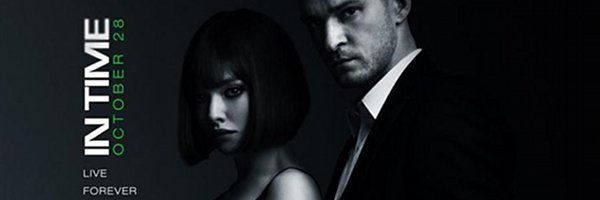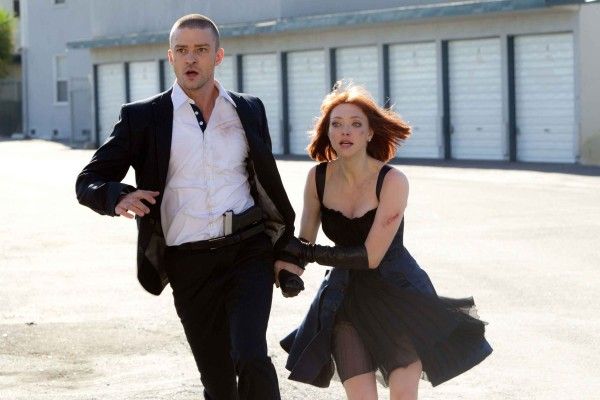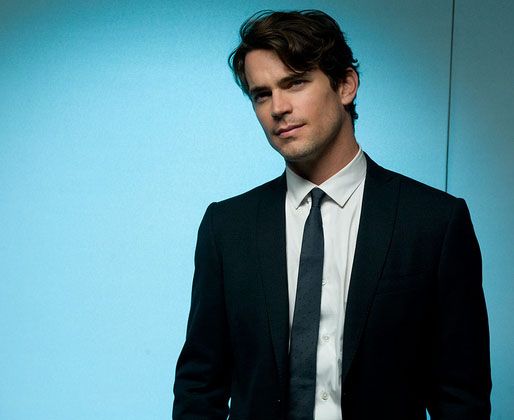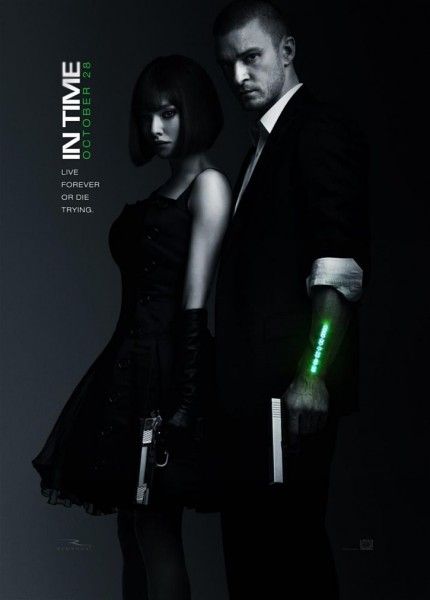Press conferences can be a difficult affair – a bunch of journalist packed together in a room, most hesitant to ask questions (they’re saving them up for their one-on-ones), the others not having the good sense to be hesitant in their question-asking prowess. Some of the worst inquiries imaginable have been uttered during the course of a junket. At the Contagion event awhile back, some intrepid reporter asked Matt Damon which character he most easily identified with – Jason Bourne or his family-man character in the film. I mean – really? All this however, does create a much looser vibe. Actors/filmmakers seem to actively await the next idiot question asked and a palpable sense of disdain drips in the air.
Case in point: The In Time press conference. Justin Timberlake, Amanda Seyfried, Vincent Kartheiser, Matt Bomer and writer/director Andrew Niccol all were ready to pounce/tear at any and all questions asked. Topics ranged from parallels between Occupy Wall Street and the film to why there aren’t any cell phones in the picture to what’s it like to run in high heels (directed at Seyfried, of course). For all this and more, hit the jump.
Of note: I did not ask any of the questions transcribed below. I merely sat there taking it all in, recording the conversation as follows. I may be the worst of them all…
Question: The movie seems very timely with Occupy Wall Street.
JUSTIN TIMBERLAKE: You’re the first person to say that. No, no, no – we did foreign yesterday and that was like the topic of the day.
AMANDA SEYFRIED: He (Niccol) actually said when we were shooting the movie – they’re going to occupy Wall Street next year when this film’s coming out – so this is a great time to make it. Didn’t you?
ANDREW NICCOL: I’m a prophet --- But it wasn’t the leaping off point for me. I wanted to write a thriller. I thought it was a great metaphor for living in the present. But as soon as you make a decision that time is going to be currency, then it should be a reflection of what’s happening today.
TIMBERLAKE: I think it’s obvious to say it’s serendipitous that this sort of social stance is happening right now – Occupy Wall Street, Occupy LA, and things like that – but I saw this movie as a very beautiful story in the midst of an otherworldly macro concept. There were some really simple themes to this guy and I just saw him as an everyday man who gets pushed too far and decides he’s not going to take it anymore. I was really excited to work with this cast and obviously Andrew – I’m a huge fan of his previous outings.
Question: Why did you decide on the age of twenty-five (as the stopping point for aging in the film)?
NICCOL: I didn’t decide that. Biology decided that. That is the age you stop fully developing. That’s the age when your frontal lope fully develops. That’s why a rental car company in America won’t rent you a car until you’re twenty-five. It’s because this alone controls reckless behavior and they don’t want to give you a car if you’re reckless. That’s why you wouldn’t switch off the aging gene unless you were fully developed.
Question: (to Seyfried) You do a lot of running in the film. How did you run in heels like that?
SEYFRIED: A lot of stunt heels.
TIMBERLAKE: We actually debated in the middle of a scene whether she should just take the heels off and run --- but she probably would of gotten lost in the frame.
NICCOL: She also would have gotten shot by the guys chasing her.
Question: Justin – you’re someone who’s done a lot with your life in a relatively short period time. In the movie one of the running themes is you can do a lot in a day. So because you’ve done so much with your life at such a young age, what would you do if all you had left was tomorrow?
TIMBERLAKE: I will pay you later. It sounds cliché but I would spend it with people that I love – my family. And if I had 24 hours...
NICCOL: You’d come to a junket.
TIMBERLAKE: Yeah – I’d come to a junket and talk to you guys. I could probably squeeze in a three hour round if I played golf by myself. That leaves me 21 hours – so I would probably spend the rest of that with the people that I love.
Question: Is there anything you haven’t done yet that you feel you might want to get in that day?
TIMBERLAKE: I’d like to Occupy Pasadena – if we can work on that.
Question: Justin, I was just wondering how much fun it was to be an action/James-Bond-like guy in the film – especially in that poker game scene?
TIMBERLAKE: I got to live out a lot of boyhood fantasies. In this movie: shooting guns, getting to learn how to stunt drive. When you’re a little kid, you obviously see those type of scenes in movies and you never picture yourself as the guy who loses at the poker match.
VINCENT KARTHEISER:: I did.
TIMBERLAKE: Well it worked out then. The script really read as it plays. I remember for three days after, I couldn’t stop thinking about the themes but also the fact that it was relentless in its pace. So yeah – the movie was a lot of fun.
Question: At any point were any of you concerned that this [film] might not translate or relate to the audiences?
TIMBERLAKE: You mean the fact that we have digital clocks on our arms? And it’s the future? You mean like that? Because it’s just a movie at the end of the day.
NICCOL: No, we didn’t try to dumb it down.
KARTHEISER:: I was just about to say – can you dumb it down for the Americans?
TIMBERLAKE: You know honestly the only answer to that that I can give is that when we actually did get into the scenes. There were some I remember, Amanda and I would go to Andrew and say you know we live in this world and this world seems like every day to us.
SEYFRIED: So why are we explaining ourselves?
TIMBERLAKE: Yeah. If anything I feel like we would take lines out because it’s always nicer I think when you can play out a scene and it can read without dialogue.
NICCOL: We didn’t try to over-explain it. We didn’t want to make it too expositional.
Question: So twenty-five is the age stopgap in the film. But what age would you all like to get stuck at and why?
KARTHEISER:: I got nothing. I mean that’s something I’ve never contemplated. I don’t know. Have you guys ever sat around and thought about something like that?
SEYFRIED: You ever think about eleven?
TIMBERLAKE: Yeah – just eleven.
KARTHEISER:: Eleven was a really good year for me.
MATT BOMER: Twenty-seven. The Saturn return year.
KARTHEISER:: Saturn return - is that a satellite?
BOMER: Maybe.
TIMBERLAKE: Yeah – that’s in the next Star Trek. I look back, as a lot of my younger years have been documented, and I can honestly say that I would not like to revisit [any of it]. I just had to go to the Environmental Media Awards and obviously it’s recycle, recycle, recycle and I literally – one of the things that popped up in my mind, probably because I’m so vain, is wow – I can think of some things I wouldn’t recycle: a couple of the outfits that I wore in ’99 – so I’m perfectly fine with aging. What about you?
SEYFRIED: Can’t wait until I get to that point where I think ‘I could relive this again’. Because I don’t think any of us want to relive anything. I just can’t wait for the future.
Question: Andrew – I found myself drawing parallels to Gattaca. I found that there was a similarity in the production design, in the future view and themes. I wondered about that connection for you but also – why in this future that has so much of the technology that we have – aren’t there any cell phones?
NICCOL: There are no bicycles either. I think that the parallel with Gattaca – when I was making that - the holy grail of genetic engineering was to just switch of the aging gene; but I just knew the implications were going to be so great that it would have to be another movie. That’s why it’s another movie. Cell phones – it’s a secret I can’t tell you.
KARTHEISER:: Well I think maybe, I hope I’m not revealing the secret, one of things you said to me that was kind of interesting – very early on you said – you know once they get this genetic aging thing down, you stop developing new things. There’s no reason to go out and create something new because you have the Holy Grail right there and you can relax. Was that the secret?
NICCOL: No, it was not. The invention of the body clock, we decided would be the death of all other invention because the poor have no time to create anything and the rich have no incentive. Why do it now when you can do it five years from now, a hundred years from now.
TIMBERLAKE: It’s the idea of aspiration – because I think so much of the tech generation has to do with aspiring to create that type of thing. As a matter of fact, I remember having that conversation too - if you had all the time in the world, it would sort of be the death of creativity.
NICCOL: That’s why there’s no new art, no new science in the movie. In fact, Amanda’s character says it perfectly at one point in the movie “The poor die and the rich don’t live.”




